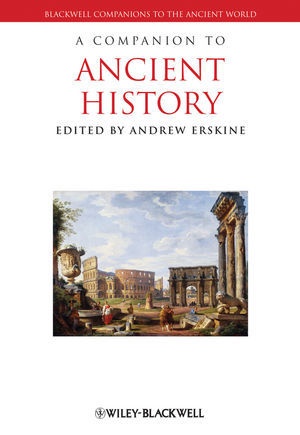Read more
Informationen zum Autor Andrew Erskine is head of Classics at University of Edinburgh. He has held an Alexander von Humboldt fellowship at the University of Munich. His publications include A Companion to the Hellenistic World (Blackwell, 2003), Troy between Greece and Rome: Local Tradition and Imperial Power (2001), and The Hellenistic Stoa: Political Thought and Action (1990). Klappentext This Companion provides a comprehensive introduction to key topics in the study of ancient history.* Examines the forms of evidence, problems, approaches, and major themes in the study of ancient history* Comprises more than 40 essays, written by leading international scholars* Moves beyond the primary focus on Greece and Rome with coverage of the various cultures within the ancient Mediterranean* Draws on the latest research in the field* Provides an essential resource for any student of ancient history Zusammenfassung To produce a companion to ancient history is obviously a monumental task, and comprehensiveness an almost impossible goal, but there are nonetheless an impressively wide range of approaches, key topics and concepts covered in this volume. Inhaltsverzeichnis List of Figures xi List of Maps xii Notes on Contributors xiii Preface xix Abbreviations, Reference Works xx Abbreviations and Glossary, Ancient Authors xxiii Timeline xxx 1 Personal Perspectives 1 Josiah Ober, Peter Derow, Andrea Giardina, Neil McLynn, Kathryn Welch Part I: Evidence 11 2 Historiography 13 John Marincola 3 Epigraphical Cultures of the Classical Mediterranean: Greek, Latin, and Beyond 23 Gregory Rowe 4 Papyrology 37 Alan K. Bowman 5 Numismatics 48 A. R. Meadows 6 Archaeology and Ancient History 59 Stephen L. Dyson 7 Oratory 67 Catherine Steel 8 Ancient History Through Ancient Literature 77 Tim Whitmarsh Part II: Problems and Approaches 87 9 Ancient History Today 89 J. A. North 10 Political History 99 Robert Morstein-Marx 11 Economic and Social History 112 Neville Morley 12 Ethnicity and Culture 123 Edward Herring 13 Population and Demography 134 Walter Scheidel 14 Writing Women into History 146 Amy Richlin 15 Interpreting Myth 154 Carol Dougherty 16 Environmental History 164 Robert Sallares Part III: People and Places 175 17 The Near East 177 Maria Brosius 18 Egypt under the Pharaohs 189 John Ray 19 The Jews 201 Gideon Bohak 20 The Greeks 213 Thomas Harrison 21 Asia Minor 222 Peter Thonemann 22 Rome 236 Christer Bruun 23 Italy beyond Rome 248 Kathryn Lomas 24 North Africa 260 Josephine Crawley Quinn 25 The Iberian Peninsula in the Roman Period 273 A. T. Fear 26 The "Celts" 284 Constanze Witt Part IV: Encountering the Divine 299 27 Religion 301 Mark Humphries 28 The Emergence of Christianity 312 John Curran Part V: Living and Dying 327 29 The Family 329 Mary Harlow and Tim Parkin 30 Food 342 John Wilkins 31 Eros: Love and Sexuality 352 James Davidson 32 Housing 368 Lisa C. Nevett 33 Entertainment 381 David Potter 34 Education 392 Jason König 35 Medicine 403 Helen King 36 Death 414 David Noy Part VI: Economy 427 37 The Mediterranean and the History of Antiquity 429 R. B...
List of contents
List of Figures
List of Maps
Notes on Contributors
Preface
Abbreviations, Reference Works
Abbreviations and Glossary, Ancient Authors
Timeline
Part I: Evidence
Part II: Problems and Approaches
Part III: People and Places
Part IV: Encountering the Divine
Part V: Living and Dying
Part VI: Economy
Part VII: Politics and Power
Part VIII: Repercussions
Bibliography
Index
Report
" Yet, however unsatisfactory the definition of Ancient History may be (seen from the angle of an Assyriologist, an Egyptologist, or an Iranologist), the appearance of this well-edited, wide ranging and most interesting volume is a felicitous event, proving that under the reign of Wikipedia there is still need to replace the dethroned Pauly-Wissowa with general studies of the highest quality. Assyriologists, Egyptologists, and Iranologists will certainly find much useful material here for them as well." ( Scripta Classica Israelica , 2012)
"The quality of the presentation is high; maps, a timeline, and indices are provided and will be of help to new students of the discipline. ( Bryn Mawr Classical Review, April 2010 )

